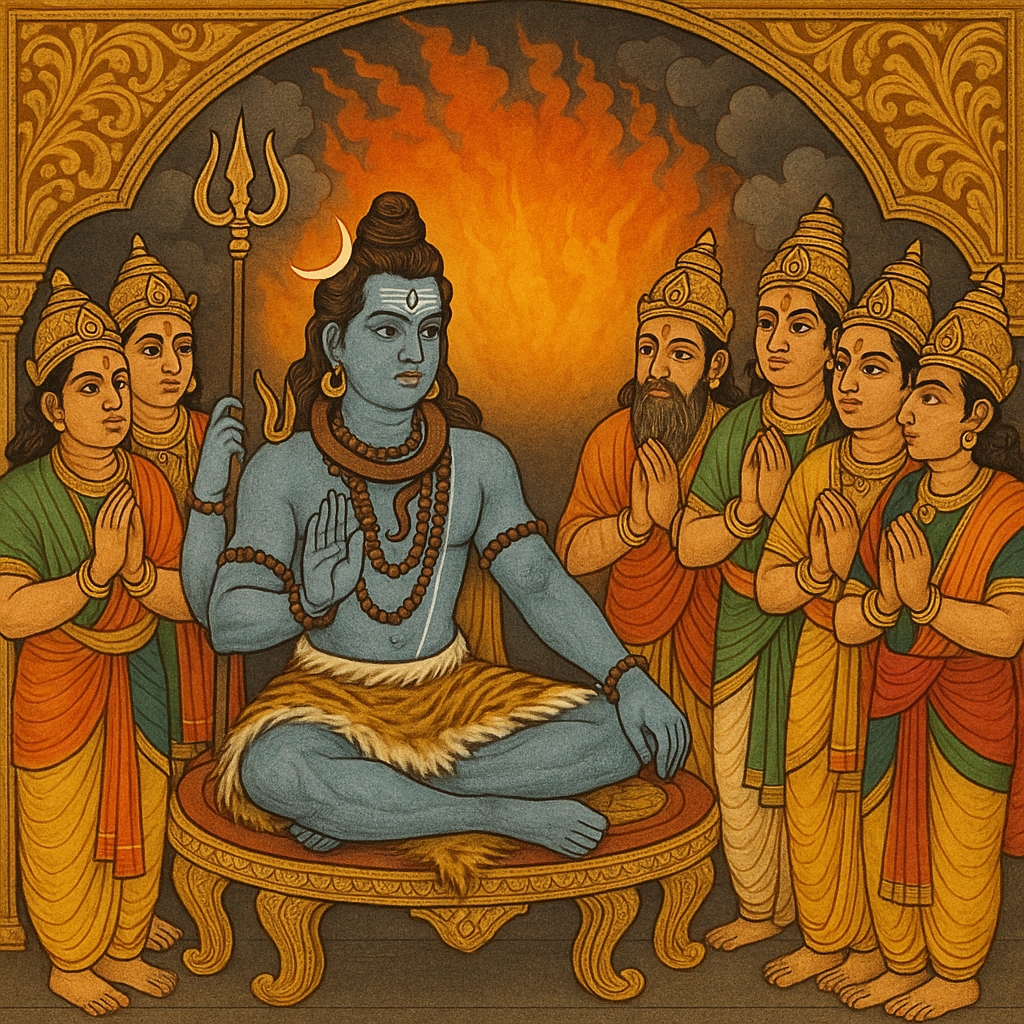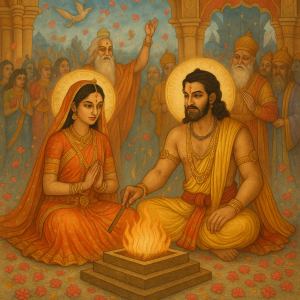The Divine Assembly and the Call to Battle
In the heavenly realms, the demigods had been humbled by the unstoppable power of Śaṅkhacūḍa, the demon-king protected by a powerful amulet and the chaste fidelity of his wife, Tulasī Devī.
After much deliberation and prayer, the demigods gathered once again before Lord Śiva, the powerful destroyer and master of mystic power. They humbly offered praises and implored him to rescue them from their fallen state.
Lord Śiva, ever compassionate to the suffering of the devas and acting on Lord Viṣṇu’s hidden plan, consented. He knew that only through divine strategy and not brute force could the seemingly invincible Śaṅkhacūḍa be overcome.
The Deception Unfolds
Śiva devised a sacred and mysterious plan. Knowing that Śaṅkhacūḍa’s strength was upheld by two secrets—the amulet given by Brahmā and the unbroken chastity of his wife—Śiva and Viṣṇu agreed on a twofold strategy.
Lord Śiva would face Śaṅkhacūḍa in battle to keep him distracted, while Lord Viṣṇu Himself, assuming the form of Śaṅkhacūḍa, would approach Tulasī to break her chastity—not by force or violence, but by divine illusion and will.
As Śiva led his armies into fierce battle, thunder and fire filled the skies. Śaṅkhacūḍa rushed to the field, unaware of what was unfolding at home.
Meanwhile, Lord Viṣṇu approached Tulasī Devī, appearing in her husband’s exact form—voice, features, scent, touch—all perfectly matched by the Lord’s mystic power.
Seeing him return from battle, Tulasī welcomed him with full heart, bathing his feet, offering food, and embracing him with love. As they united intimately, her chastity was mystically transferred—even though she remained unaware of the divine disguise.
The moment her chastity was broken, the spiritual shield that protected Śaṅkhacūḍa shattered.
The Battle Ends
At that very moment, on the battlefield, Lord Śiva struck Śaṅkhacūḍa. Though the demon fought valiantly, his strength failed, and he fell—liberated, purified, and delivered by the Lord’s plan.
His soul ascended to Vaikuṇṭha, having fulfilled his mission. For though born in a demon body, Śaṅkhacūḍa was an eternal associate of Kṛṣṇa, cursed for a divine purpose. His deliverance marked the end of his earthly role and the return to eternal service.
Tulasī’s Realization and Anguish
Back at the palace, Tulasī’s joy faded when she noticed subtle differences. Her sharp mind and deep devotion discerned the truth—this was not her husband.
“You are not Śaṅkhacūḍa!” she cried. “Who are you that dared deceive me and violate my chastity?”
Then Lord Viṣṇu revealed His true form—four-armed, bluish in complexion, resplendent with ornaments, lotus-eyed and smiling with divine compassion.
Tulasī trembled in disbelief and fury.
“You are the protector of dharma,” she cried, “yet You have broken the purity of a devoted wife. I was faithful. I served You as Śaṅkhacūḍa. But You deceived me! For this, I curse You! May You become a stone!”
Lord Viṣṇu accepted her curse with folded hands. Smiling gently, He replied:
“O Devī, by your curse I shall appear as a stone deity to receive the worship of devotees. I shall manifest as Śālagrāma-śilā, and you, in turn, shall appear as the Tulasī plant, worshiped and honored by all.”
In that moment, her anger transformed into divine ecstasy. She remembered her true identity as a gopī of Goloka, and she saw Kṛṣṇa before her, not as a deceiver but as the Supreme Beloved who had fulfilled her deepest longing—to unite with Him eternally.
Lessons to Be Learned
1. The Lord Uses Illusion Not for Sense Gratification, but for Divine Purpose
Śrīla Prabhupāda taught that Kṛṣṇa may deceive, but His deception is for the liberation of souls, not exploitation. Here, Lord Viṣṇu’s impersonation was not immoral but a divine arrangement to deliver His eternal associates and fulfill destiny.
2. Chastity Is a Sacred Power, But Devotion Is Supreme
Tulasī’s chastity gave Śaṅkhacūḍa his strength, but ultimately, it was her devotion to Viṣṇu that made her eternally worshipable. In bhakti, bodily purity is important, but it is the purity of surrender that makes a devotee glorious.
“Not birth, not external conduct, but surrender to the Lord is the true measure of a devotee.” – Śrīla Prabhupāda
3. The Lord Accepts the Curses of His Devotees as Blessings
Rather than retaliating against Tulasī’s curse, Viṣṇu embraced it, transforming it into the appearance of Śālagrāma-śilā, the sacred stone worshiped as His personal form. This shows the supreme humility and affection of the Lord toward His devotees.
4. A Demon May Be a Devotee in Disguise
Śaṅkhacūḍa was outwardly a demon, yet inwardly he was a devotee cursed to take that form. Śrīla Prabhupāda explained that sometimes great souls descend as demons to fulfill the Lord’s pastimes and to teach us deep spiritual lessons.
5. Devotees Should Not Judge Kṛṣṇa’s Actions Through Mundane Morality
Kṛṣṇa’s actions, even when appearing deceptive, are never sinful. They are beyond the dualities of this world. As the Bhagavad-gītā declares (BG 4.9):
“One who understands the transcendental nature of My appearance and activities does not, upon leaving the body, take birth again in this material world, but attains My eternal abode.”
6. Tulasī Is the Embodiment of Devotional Purity
Even when angered and deceived, Tulasī Devī’s surrender remained unshaken. This is the glory of a true devotee—one who questions, feels pain, even curses, but ultimately loves and surrenders fully. Her transformation into the Tulasī plant made her indispensable in Viṣṇu’s worship.



